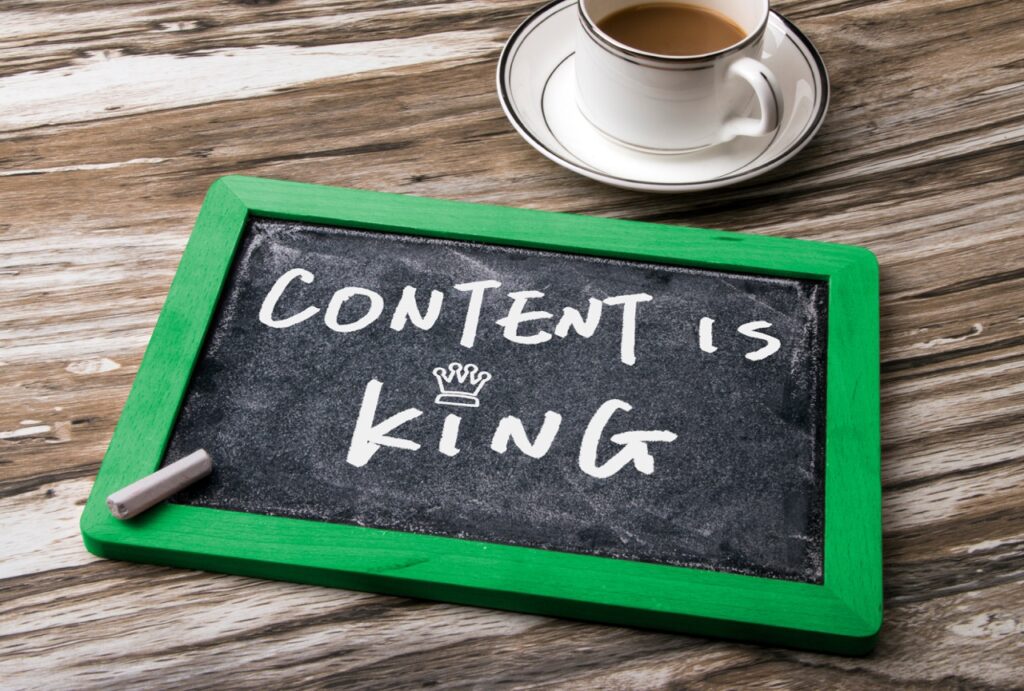How important is SEO in a content marketing strategy?
Many terms for aspects of a digital marketing strategy may start to sound like they’re describing the same thing. There are, however, nuances to what is involved behind the scenes when it comes to optimizing online reach.
What is Content Marketing?
Content marketing refers to the process of creating online content and publishing it. You may or may not have a team like Gravitate to optimize what you’re producing. Even if you’re not doing backend work to promote your content, it should still be authoritative and valuable to your audience. Otherwise it’s going to feel like you’re posting in a vacuum.
Examples of content marketing:
- Blog articles
- Pinnable infographics
- Videos
- Social media posts (Twitter, Instagram, Facebook, etc…)
In order to market your brand, you’re simply creating a presence online. There doesn’t have to be anything more than that. Content marketing can be organic if you have the time and patience to wait for results.
What is SEO Marketing?
When you add search engine optimization into the mix, you’re fine-tuning your content to give it better reach. You’re producing content with the purpose of conversion. You’re hopefully saving yourself time and money by expediting results. Even with optimization, however, digital marketing results take time, as explained HERE in another blog article.
Examples of SEO:
- Use of keywords in content
- Use of alt tags on images
- Optimal website speed
- Website design
- Content quality and design
- Backlinks
Optimizing SEO may be as simple as using popular, relevant keywords not just in the body of your blog articles, but in headers and image tags as well. If you’re not sure what keywords you should be using, that’s when a digital marketing company like Gravitate comes in. We can analyze data to determine keywords that make the most sense for your brand and its goals.
As you can see, combining SEO with content marketing helps get your content seen by more Internet users, which may lead to more conversions.
Organic vs Paid Digital Marketing
To organically increase your online presence, you can still utilize SEO tactics. Often in the digital marketing world, organic growth refers to unpaid content posting. It means you’re not boosting your posts with ads, or buying bots to engage with your content.
Organic growth is a good strategy since Google can eventually catch on if you’re doing nothing but paying to promote your brand online. Nonsensically stuffing your blog articles with keywords or excessive backlinks would not be considered organic, and Google will probably end up punishing your page with less traffic as a result.
When done thoughtfully, paid digital marketing tactics can help increase your brand’s online reach. As part of your strategy, you can pay to have your links show up in search engine result pages (SERPs) so that when people Google certain keywords, they see you at the top.
Your paid digital marketing strategy may also involve occasionally boosting social media posts to reach more of your targeted audience. This can be particularly useful when you’re rolling out a new product or service and you want to get a few more eyes on it.
Content Marketing and SEO – A Perfect Pair
Ultimately, you can have the most perfect content ever, but it never gains any traction because the Internet is FULL of good content. That’s why adding SEO is key to your brand’s success. Without it, you have little chance of beating the competition. On the flip side, you can optimize a page within an inch of its life, but if the content isn’t authentic, informative, or written by a real human, it flops.
Not to be overly dramatic, but writer Karan Sharma for Forbes once stated that “SEO without content marketing is like a body without a soul.” Optimizing content gives it life, increasing traffic, shares, and overall ranking.
Depending on where your website is hosted, you have a lot of options for SEO. You can install plugins to help you check off the steps for optimizing your content, or you can have an in-house team manage SEO and content for you. Or, you can outsource your digital marketing strategy to a team like Gravitate that focuses on many facets of optimization, including:
- SEO
- Building or updating websites
- PPC
- Email marketing
- Social media content
- Video content
Our creatives can help fine-tune a strategy that makes sense for your brand and your target audience.
